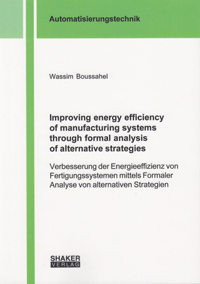
Shop : Details
Shop
Details

April 2017
Wassim Boussahel
Improving energy efficiency of manufacturing systems through formal analysis of alternative strategies
Verbesserung der Energieeffizienz von Fertigungssystemen mittels Formaler Analyse von alternativen Strategien
Energy efficiency is a widely discussed topic in in the manufacturing industry due to environmental and economic reasons. Manufacturers are always looking for being more energy-efficient which is a recipe for being more competitive, reducing waste and spending less money on energy than it is necessary. Potentials to save energy are present at every level and a special attention should be given to unused energy during idle times. Switching systems during these times to energy-efficient modes is one of these potentials that is somehow neglected and not very much explored in the literature in terms of formal models. This problem can be reduced to models exhibiting parallel strategies displaying different timing and energetic profiles and dependability between the different systems; the ultimate goal is to find optimal strategies respecting all the manufacturing-related requirements. The objective of the thesis is to formalize such problems by proposing a methodology directly implementable in the model checker PRISM. This model checker imposes high restrictions on continuous variables used in automata-based models; this makes a discrete approach more appropriate for modeling systems for the purpose of evaluation and optimization. Use-case examples are presented in order to illustrate the approach and explain the extent of what could be done with automata-based models in the model checker PRISM.
Keywords: Energy efficiency; Formal analysis; Manufacturing systems
Available online documents for this title
You need Adobe Reader, to view these files. Here you will find a little help and information for downloading the PDF files.
Please note that the online documents cannot be printed or edited.
Please also see further information at: Help and Information.
Please also see further information at: Help and Information.
| Document |  | Document | ||
| Type |  | |||
| Costs |  | 34,35 € | ||
| Action |  | Purchase in obligation and download the file | ||
| Document |  | Table of contents | ||
| Type |  | |||
| Costs |  | free | ||
| Action |  | Download the file | ||
User settings for registered online customers (online documents)
You can change your address details here and access documents you have already ordered.
User
Not logged in
Export of bibliographic data
Shaker Verlag GmbH
Am Langen Graben 15a
52353 Düren
Germany
Am Langen Graben 15a
52353 Düren
Germany
Mon. - Thurs. 8:00 a.m. to 4:00 p.m.
Fri. 8:00 a.m. to 3:00 p.m.
Fri. 8:00 a.m. to 3:00 p.m.
Contact us. We will be happy to help you.

